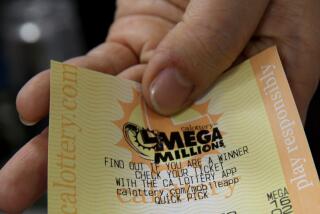More Winners Make for Better Business : Lotto rolls the dice for bigger payoffs and comes up short; an investigation is needed
- Share via
In retrospect, it mangles all logic and boggles the mind, but this is what the lottery commission was telling us:
If you double the odds against winning in its big-bucks Lotto game, you will set off a stampede of ticket buyers.
That’s what the lottery staff said its market research was saying: It was predicting a stampede because the payoffs, though fewer in number, would be greater than ever.
There was a stampede all right, but it was in the opposite direction: Lotto players began to stay away in droves.
State government has both a moral and a financial obligation to find out what has gone wrong and put a stop to it.
The lottery is not a private casino. It exists under state law. Its policy-making commission is appointed by the governor of the state. One of the big selling points when it was put on the California ballot was that at least 34% of anything it earned would be spent on public education.
Until recently, there were two kinds of complaints about the lottery.
One was that there were more losers than winners. But there’s not much any lottery commission can do about that--except not to stack the odds so much against the player that no one wants to play.
A more serious complaint was that the agency spent $70 million a year on advertising to whip Californians into gambling frenzies, and there is no way to avoid the uncomfortable truth that when the frenzy reaches the poor, they spend more of their income for tickets than anyone else.
But state auditors seem never to have complained.
The newest complaints are more like challenges to the commission’s judgment. It deliberately changed the odds of winning--done to let the dollar pot snowball into huge amounts of money, as in a recent payoff of more than $40 million.
Does common sense say that you will attract more players if one person occasionally wins $40 million than if 40 people regularly win $1 million? Answer: Not common sense as anyone has ever understood it. And, indeed, people who play the state game appear not to be as dumb as some commissioners perhaps think they are: Lotto income has plunged 25% since the lottery staff tampered with the odds.
It may very well be that lotteries habitually defy logic. But the state government probably needs an independent study to judge whether the lottery machine knows what it is doing. The stakes for California schools alone are high enough to warrant it.
More to Read
Go beyond the scoreboard
Get the latest on L.A.'s teams in the daily Sports Report newsletter.
You may occasionally receive promotional content from the Los Angeles Times.










